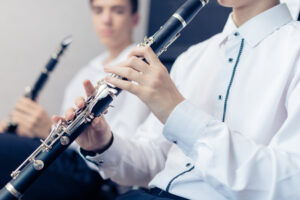 If you’ve been playing the clarinet for a while, you’re probably aware that a majority of young clarinetists switch over to saxophone within the first couple years of being involved in music. While the saxophone is great and has many uses in popular styles of music, I would encourage all clarinetists to think a little harder when they are offered the opportunity to play saxophone instead of dropping the instrument right away. Beyond that, staying involved in your clarinet lessons in Seattle is beneficial to your student in countless ways.
If you’ve been playing the clarinet for a while, you’re probably aware that a majority of young clarinetists switch over to saxophone within the first couple years of being involved in music. While the saxophone is great and has many uses in popular styles of music, I would encourage all clarinetists to think a little harder when they are offered the opportunity to play saxophone instead of dropping the instrument right away. Beyond that, staying involved in your clarinet lessons in Seattle is beneficial to your student in countless ways.
Here are 4 reasons to stick with the clarinet instead of switching to the saxophone or dropping music altogether.
Teamwork
In some ways, being a part of your school’s band or orchestra program is like being a part of an athletic sports team. Unless your student is involved in marching band, music is only athletic in the sense of your student using a lot of air and some muscles in their playing. One of the most compelling reasons to stay involved in music is that it develops your students’ social skills and abilities to work in a team to achieve a common goal. Enrolling your student with a clarinet teacher in Seattle shows them the value of this teamwork even further; they will hone their abilities and bring their best selves to rehearsals.
Learning Clarinet Better = Learning More About the Saxophone
As you and your student may or may not already be aware of, the clarinet and saxophone are both single-reed instruments. This means that both instruments are played very similarly. The fingerings and notes are very similar as well. As a result when you get better at one, you get better at both! Now you may be wondering which is better to focus on if your goal is to be great at both. Believe it or not, learning to play the clarinet will help your saxophone abilities more than learning the saxophone will help your clarinet abilities. This is due to the fact that the clarinet is traditionally considered to be much more difficult than the saxophone. It takes more of a concentrated airstream, requiring more control. The repertoire also tends to be more challenging, pushing a clarinetist’s technical dexterity.
For these reasons, learning the clarinet makes the transition to saxophone quite easy. If one were to learn the saxophone first, the transition to clarinet tends to be rather difficult in comparison. If you are interested in learning both, consider enrolling in clarinet and saxophone lessons in Seattle!
The Practicality of Size and Cost
This one tends to be a bit more obvious, but this is an important factor for many students depending on their commute to school, locker size, budget, and countless other factors. It is always worth considering practical reasoning behind sticking to one instrument over another. Of course the clarinet is smaller than the saxophone, and even the smallest common variant of saxophone (the soprano saxophone) is larger than a clarinet. Beyond that, saxophones tend to be more expensive as well. Due to their larger bulk and higher average cost, this also results in repairs being more expensive.
Clarinetist’s Play Super Awesome Music
Clarinetists are blessed to have an incredible collection of music and orchestral solos in their repertoire. The music speaks for itself here. Check out the Opening Solo to George Gershwin’s Rhapsody in Blue, visuals from Fantasia 2000, the Opening Solo in Ottorino Respighi’s Pines of Rome: Movement III, Nikolai Rimsky-Korsakov’s Scheherazade, which in my opinion has some of the greatest clarinet solo moments ever written all throughout the music, or Scott McAllister’s Black Dog for clarinet and piano.
As you can clearly hear, the clarinet has an incredibly wide range of music it can be effective in! Enrolling in clarinet lessons in Seattle will bring you one step closer to learning this extraordinary music.
Contact us today to find out more about our teachers! They come right to your home for every lesson, plus we offer virtual music lessons, too. Our online music lessons are taught by local music teachers with live lessons tailored to your child!
By Brian Schappals